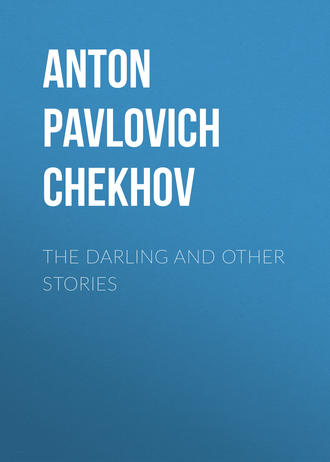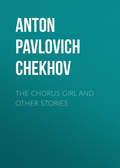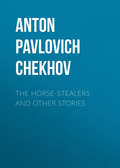
Антон Чехов
The Darling and Other Stories
XI
She travelled with Panaurov in a reserved compartment; he had on his head an astrachan cap of peculiar shape.
"Yes, Petersburg did not satisfy me," he said, drawling, with a sigh. "They promise much, but nothing definite. Yes, my dear girl. I have been a Justice of the Peace, a member of the local Board, chairman of the Board of Magistrates, and finally councillor of the provincial administration. I think I have served my country and have earned the right to receive attention; but-would you believe it? – I can never succeed in wringing from the authorities a post in another town.."
Panaurov closed his eyes and shook his head.
"They don't recognise me," he went on, as though dropping asleep. "Of course I'm not an administrator of genius, but, on the other hand, I'm a decent, honest man, and nowadays even that's something rare. I regret to say I have not been always quite straightforward with women, but in my relations with the Russian government I've always been a gentleman. But enough of that," he said, opening his eyes; "let us talk of you. What put it into your head to visit your papa so suddenly?"
"Well… I had a little misunderstanding with my husband," said Yulia, looking at his cap.
"Yes. What a queer fellow he is! All the Laptevs are queer. Your husband's all right-he's nothing out of the way, but his brother Fyodor is a perfect fool."
Panaurov sighed and asked seriously:
"And have you a lover yet?"
Yulia looked at him in amazement and laughed.
"Goodness knows what you're talking about."
It was past ten o'clock when they got out at a big station and had supper. When the train went on again Panaurov took off his greatcoat and his cap, and sat down beside Yulia.
"You are very charming, I must tell you," he began. "Excuse me for the eating-house comparison, but you remind me of fresh salted cucumber; it still smells of the hotbed, so to speak, and yet has a smack of the salt and a scent of fennel about it. As time goes on you will make a magnificent woman, a wonderful, exquisite woman. If this trip of ours had happened five years ago," he sighed, "I should have felt it my duty to join the ranks of your adorers, but now, alas, I'm a veteran on the retired list."
He smiled mournfully, but at the same time graciously, and put his arm round her waist.
"You must be mad!" she said; she flushed crimson and was so frightened that her hands and feet turned cold.
"Leave off, Grigory Nikolaevitch!"
"What are you afraid of, dear?" he asked softly. "What is there dreadful about it? It's simply that you're not used to it."
If a woman protested he always interpreted it as a sign that he had made an impression on her and attracted her. Holding Yulia round the waist, he kissed her firmly on the cheek, then on the lips, in the full conviction that he was giving her intense gratification. Yulia recovered from her alarm and confusion, and began laughing. He kissed her once more and said, as he put on his ridiculous cap:
"That is all that the old veteran can give you. A Turkish Pasha, a kind-hearted old fellow, was presented by some one-or inherited, I fancy it was-a whole harem. When his beautiful young wives drew up in a row before him, he walked round them, kissed each one of them, and said: 'That is all that I am equal to giving you.' And that's just what I say, too."
All this struck her as stupid and extraordinary, and amused her. She felt mischievous. Standing up on the seat and humming, she got a box of sweets from the shelf, and throwing him a piece of chocolate, shouted:
"Catch!"
He caught it. With a loud laugh she threw him another sweet, then a third, and he kept catching them and putting them into his mouth, looking at her with imploring eyes; and it seemed to her that in his face, his features, his expression, there was a great deal that was feminine and childlike. And when, out of breath, she sat down on the seat and looked at him, laughing, he tapped her cheek with two fingers, and said as though he were vexed:
"Naughty girl!"
"Take it," she said, giving him the box. "I don't care for sweet things."
He ate up the sweets-every one of them, and locked the empty box in his trunk; he liked boxes with pictures on them.
"That's mischief enough, though," he said. "It's time for the veteran to go bye-bye."
He took out of his hold-all a Bokhara dressing-gown and a pillow, lay down, and covered himself with the dressing-gown.
"Good-night, darling!" he said softly, and sighed as though his whole body ached.
And soon a snore was heard. Without the slightest feeling of constraint, she, too, lay down and went to sleep.
When next morning she drove through her native town from the station homewards, the streets seemed to her empty and deserted. The snow looked grey, and the houses small, as though some one had squashed them. She was met by a funeral procession: the dead body was carried in an open coffin with banners.
"Meeting a funeral, they say, is lucky," she thought.
There were white bills pasted in the windows of the house where Nina Fyodorovna used to live.
With a sinking at her heart she drove into her own courtyard and rang at the door. It was opened by a servant she did not know-a plump, sleepy-looking girl wearing a warm wadded jacket. As she went upstairs Yulia remembered how Laptev had declared his love there, but now the staircase was unscrubbed, covered with foot-marks. Upstairs in the cold passage patients were waiting in their out-door coats. And for some reason her heart beat violently, and she was so excited she could scarcely walk.
The doctor, who had grown even stouter, was sitting with a brick-red face and dishevelled hair, drinking tea. Seeing his daughter, he was greatly delighted, and even lacrymose. She thought that she was the only joy in this old man's life, and much moved, she embraced him warmly, and told him she would stay a long time-till Easter. After taking off her things in her own room, she went back to the dining-room to have tea with him. He was pacing up and down with his hands in his pockets, humming, "Ru-ru-ru"; this meant that he was dissatisfied with something.
"You have a gay time of it in Moscow," he said. "I am very glad for your sake… I'm an old man and I need nothing. I shall soon give up the ghost and set you all free. And the wonder is that my hide is so tough, that I'm alive still! It's amazing!"
He said that he was a tough old ass that every one rode on. They had thrust on him the care of Nina Fyodorovna, the worry of her children, and of her burial; and that coxcomb Panaurov would not trouble himself about it, and had even borrowed a hundred roubles from him and had never paid it back.
"Take me to Moscow and put me in a madhouse," said the doctor. "I'm mad; I'm a simple child, as I still put faith in truth and justice."
Then he found fault with her husband for his short-sightedness in not buying houses that were being sold so cheaply. And now it seemed to Yulia that she was not the one joy in this old man's life. While he was seeing his patients, and afterwards going his rounds, she walked through all the rooms, not knowing what to do or what to think about. She had already grown strange to her own town and her own home. She felt no inclination to go into the streets or see her friends; and at the thought of her old friends and her life as a girl, she felt no sadness nor regret for the past.
In the evening she dressed a little more smartly and went to the evening service. But there were only poor people in the church, and her splendid fur coat and hat made no impression. And it seemed to her that there was some change in the church as well as in herself. In old days she had loved it when they read the prayers for the day at evening service, and the choir sang anthems such as "I will open my lips." She liked moving slowly in the crowd to the priest who stood in the middle of the church, and then to feel the holy oil on her forehead; now she only waited for the service to be over. And now, going out of the church, she was only afraid that beggars would ask for alms; it was such a bore to have to stop and feel for her pockets; besides, she had no coppers in her pocket now-nothing but roubles.
She went to bed early, and was a long time in going to sleep. She kept dreaming of portraits of some sort, and of the funeral procession she had met that morning. The open coffin with the dead body was carried into the yard, and brought to a standstill at the door; then the coffin was swung backwards and forwards on a sheet, and dashed violently against the door. Yulia woke and jumped up in alarm. There really was a bang at the door, and the wire of the bell rustled against the wall, though no ring was to be heard.
The doctor coughed. Then she heard the servant go downstairs, and then come back.
"Madam!" she said, and knocked at the door. "Madam!"
"What is it?" said Yulia.
"A telegram for you!"
Yulia went out to her with a candle. Behind the servant stood the doctor, in his night-clothes and greatcoat, and he, too, had a candle in his hand. "Our bell is broken," he said, yawning sleepily. "It ought to have been mended long ago."
Yulia broke open the telegram and read:
"We drink to your health. – YARTSEV, KOTCHEVOY."
"Ah, what idiots!" she said, and burst out laughing; and her heart felt light and gay.
Going back into her room, she quietly washed and dressed, then she spent a long time in packing her things, until it was daylight, and at midday she set off for Moscow.
XII
In Holy Week the Laptevs went to an exhibition of pictures in the school of painting. The whole family went together in the Moscow fashion, the little girls, the governess, Kostya, and all.
Laptev knew the names of all the well-known painters, and never missed an exhibition. He used sometimes to paint little landscape paintings when he was in the country in the summer, and he fancied he had a good deal of taste, and that if he had studied he might have made a good painter. When he was abroad he sometimes used to go to curio shops, examining the antiques with the air of a connoisseur and giving his opinion on them. When he bought any article he gave just what the shopkeeper liked to ask for it and his purchase remained afterwards in a box in the coach-house till it disappeared altogether. Or going into a print shop, he would slowly and attentively examine the engravings and the bronzes, making various remarks on them, and would buy a common frame or a box of wretched prints. At home he had pictures always of large dimensions but of inferior quality; the best among them were badly hung. It had happened to him more than once to pay large sums for things which had afterwards turned out to be forgeries of the grossest kind. And it was remarkable that, though as a rule timid in the affairs of life, he was exceedingly bold and self-confident at a picture exhibition. Why?
Yulia Sergeyevna looked at the pictures as her husband did, through her open fist or an opera-glass, and was surprised that the people in the pictures were like live people, and the trees like real trees. But she did not understand art, and it seemed to her that many pictures in the exhibition were alike, and she imagined that the whole object in painting was that the figures and objects should stand out as though they were real, when you looked at the picture through your open fist.
"That forest is Shiskin's," her husband explained to her. "He always paints the same thing… But notice snow's never such a lilac colour as that… And that boy's left arm is shorter than his right."
When they were all tired and Laptev had gone to look for Kostya, that they might go home, Yulia stopped indifferently before a small landscape. In the foreground was a stream, over it a little wooden bridge; on the further side a path that disappeared in the dark grass; a field on the right; a copse; near it a camp fire-no doubt of watchers by night; and in the distance there was a glow of the evening sunset.
Yulia imagined walking herself along the little bridge, and then along the little path further and further, while all round was stillness, the drowsy landrails calling and the fire flickering in the distance. And for some reason she suddenly began to feel that she had seen those very clouds that stretched across the red part of the sky, and that copse, and that field before, many times before. She felt lonely, and longed to walk on and on along the path; and there, in the glow of sunset was the calm reflection of something unearthly, eternal.
"How finely that's painted!" she said, surprised that the picture had suddenly become intelligible to her.
"Look, Alyosha! Do you see how peaceful it is?"
She began trying to explain why she liked the landscape so much, but neither Kostya nor her husband understood her. She kept looking at the picture with a mournful smile, and the fact that the others saw nothing special in it troubled her. Then she began walking through the rooms and looking at the pictures again. She tried to understand them and no longer thought that a great many of them were alike. When, on returning home, for the first time she looked attentively at the big picture that hung over the piano in the drawing-room, she felt a dislike for it, and said:
"What an idea to have pictures like that!"
And after that the gilt cornices, the Venetian looking-glasses with flowers on them, the pictures of the same sort as the one that hung over the piano, and also her husband's and Kostya's reflections upon art, aroused in her a feeling of dreariness and vexation, even of hatred.
Life went on its ordinary course from day to day with no promise of anything special. The theatrical season was over, the warm days had come. There was a long spell of glorious weather. One morning the Laptevs attended the district court to hear Kostya, who had been appointed by the court to defend some one. They were late in starting, and reached the court after the examination of the witnesses had begun. A soldier in the reserve was accused of theft and housebreaking. There were a great number of witnesses, washerwomen; they all testified that the accused was often in the house of their employer-a woman who kept a laundry. At the Feast of the Exaltation of the Cross he came late in the evening and began asking for money; he wanted a pick-me-up, as he had been drinking, but no one gave him anything. Then he went away, but an hour afterwards he came back, and brought with him some beer and a soft gingerbread cake for the little girl. They drank and sang songs almost till daybreak, and when in the morning they looked about, the lock of the door leading up into the attic was broken, and of the linen three men's shirts, a petticoat, and two sheets were missing. Kostya asked each witness sarcastically whether she had not drunk the beer the accused had brought. Evidently he was insinuating that the washerwomen had stolen the linen themselves. He delivered his speech without the slightest nervousness, looking angrily at the jury.
He explained what robbery with housebreaking meant, and the difference between that and simple theft. He spoke very circumstantially and convincingly, displaying an unusual talent for speaking at length and in a serious tone about what had been know to every one long before. And it was difficult to make out exactly what he was aiming at. From his long speech the foreman of the jury could only have deduced "that it was housebreaking but not robbery, as the washerwomen had sold the linen for drink themselves; or, if there had been robbery, there had not been housebreaking." But obviously, he said just what was wanted, as his speech moved the jury and the audience, and was very much liked. When they gave a verdict of acquittal, Yulia nodded to Kostya, and afterwards pressed his hand warmly.
In May the Laptevs moved to a country villa at Sokolniki. By that time Yulia was expecting a baby.
XIII
More than a year had passed. Yulia and Yartsev were lying on the grass at Sokolniki not far from the embankment of the Yaroslav railway; a little distance away Kotchevoy was lying with hands under his head, looking at the sky. All three had been for a walk, and were waiting for the six o'clock train to pass to go home to tea.
"Mothers see something extraordinary in their children, that is ordained by nature," said Yulia. "A mother will stand for hours together by the baby's cot looking at its little ears and eyes and nose, and fascinated by them. If any one else kisses her baby the poor thing imagines that it gives him immense pleasure. And a mother talks of nothing but her baby. I know that weakness in mothers, and I keep watch over myself, but my Olga really is exceptional. How she looks at me when I'm nursing her! How she laughs! She's only eight months old, but, upon my word, I've never seen such intelligent eyes in a child of three."
"Tell me, by the way," asked Yartsev: "which do you love most- your husband or your baby?"
Yulia shrugged her shoulders.
"I don't know," she said. "I never was so very fond of my husband, and Olga is in reality my first love. You know that I did not marry Alexey for love. In old days I was foolish and miserable, and thought that I had ruined my life and his, and now I see that love is not necessary-that it is all nonsense."
"But if it is not love, what feeling is it that binds you to your husband? Why do you go on living with him?"
"I don't know… I suppose it must be habit. I respect him, I miss him when he's away for long, but that's-not love. He is a clever, honest man, and that's enough to make me happy. He is very kind and good-hearted.."
"Alyosha's intelligent, Alyosha's good," said Kostya, raising his head lazily; "but, my dear girl, to find out that he is intelligent, good, and interesting, you have to eat a hundredweight of salt with him… And what's the use of his goodness and intelligence? He can fork out money as much as you want, but when character is needed to resist insolence or aggressiveness, he is faint-hearted and overcome with nervousness. People like your amiable Alyosha are splendid people, but they are no use at all for fighting. In fact, they are no use for anything."
At last the train came in sight. Coils of perfectly pink smoke from the funnels floated over the copse, and two windows in the last compartment flashed so brilliantly in the sun, that it hurt their eyes to look at it.
"Tea-time!" said Yulia Sergeyevna, getting up.
She had grown somewhat stouter of late, and her movements were already a little matronly, a little indolent.
"It's bad to be without love though," said Yartsev, walking behind her. "We talk and read of nothing else but love, but we do very little loving ourselves, and that's really bad."
"All that's nonsense, Ivan Gavrilitch," said Yulia. "That's not what gives happiness."
They had tea in the little garden, where mignonette, stocks, and tobacco plants were in flower, and spikes of early gladiolus were just opening. Yartsev and Kotchevoy could see from Yulia's face that she was passing through a happy period of inward peace and serenity, that she wanted nothing but what she had, and they, too, had a feeling of peace and comfort in their hearts. Whatever was said sounded apt and clever; the pines were lovely-the fragrance of them was exquisite as it had never been before; and the cream was very nice; and Sasha was a good, intelligent child.
After tea Yartsev sang songs, accompanying himself on the piano, while Yulia and Kotchevoy sat listening in silence, though Yulia got up from time to time, and went softly indoors, to take a look at the baby and at Lida, who had been in bed for the last two days feverish and eating nothing.
"My friend, my tender friend," sang Yartsev. "No, my friends, I'll be hanged if I understand why you are all so against love!" he said, flinging back his head. "If I weren't busy for fifteen hours of the twenty-four, I should certainly fall in love."
Supper was served on the verandah; it was warm and still, but Yulia wrapped herself in a shawl and complained of the damp. When it got dark, she seemed not quite herself; she kept shivering and begging her visitors to stay a little longer. She regaled them with wine, and after supper ordered brandy to keep them from going. She didn't want to be left alone with the children and the servants.
"We summer visitors are getting up a performance for the children," she said. "We have got everything-a stage and actors; we are only at a loss for a play. Two dozen plays of different sorts have been sent us, but there isn't one that is suitable. Now, you are fond of the theatre, and are so good at history," she said, addressing Yartsev. "Write an historical play for us."
"Well, I might."
The men drank up all the brandy, and prepared to go.
It was past ten, and for summer-villa people that was late.
"How dark it is! One can't see a bit," said Yulia, as she went with them to the gate. "I don't know how you'll find your way. But, isn't it cold?"
She wrapped herself up more closely and walked back to the porch.
"I suppose my Alexey's playing cards somewhere," she called to them. "Good-night!"
After the lighted rooms nothing could be seen. Yartsev and Kostya groped their way like blind men to the railway embankment and crossed it.
"One can't see a thing," said Kostya in his bass voice, standing still and gazing at the sky. "And the stars, the stars, they are like new three-penny-bits. Gavrilitch!"
"Ah?" Yartsev responded somewhere in the darkness.
"I say, one can't see a thing. Where are you?"
Yartsev went up to him whistling, and took his arm.
"Hi, there, you summer visitors!" Kostya shouted at the top of his voice. "We've caught a socialist."
When he was exhilarated he was always very rowdy, shouting, wrangling with policemen and cabdrivers, singing, and laughing violently.
"Nature be damned," he shouted.
"Come, come," said Yartsev, trying to pacify him. "You mustn't. Please don't."
Soon the friends grew accustomed to the darkness, and were able to distinguish the outlines of the tall pines and telegraph posts. From time to time the sound of whistles reached them from the station and the telegraph wires hummed plaintively. From the copse itself there came no sound, and there was a feeling of pride, strength, and mystery in its silence, and on the right it seemed that the tops of the pines were almost touching the sky. The friends found their path and walked along it. There it was quite dark, and it was only from the long strip of sky dotted with stars, and from the firmly trodden earth under their feet, that they could tell they were walking along a path. They walked along side by side in silence, and it seemed to both of them that people were coming to meet them. Their tipsy exhilaration passed off. The fancy came into Yartsev's mind that perhaps that copse was haunted by the spirits of the Muscovite Tsars, boyars, and patriarchs, and he was on the point of telling Kostya about it, but he checked himself.
When they reached the town gate there was a faint light of dawn in the sky. Still in silence, Yartsev and Kotchevoy walked along the wooden pavement, by the cheap summer cottages, eating-houses, timber-stacks. Under the arch of interlacing branches, the damp air was fragrant of lime-trees, and then a broad, long street opened before them, and on it not a soul, not a light… When they reached the Red Pond, it was daylight.
"Moscow-it's a town that will have to suffer a great deal more," said Yartsev, looking at the Alexyevsky Monastery.
"What put that into your head?"
"I don't know. I love Moscow."
Both Yartsev and Kostya had been born in Moscow, and adored the town, and felt for some reason antagonistic to every other town. Both were convinced that Moscow was a remarkable town, and Russia a remarkable country. In the Crimea, in the Caucasus, and abroad, they felt dull, uncomfortable, and ill at ease, and they thought their grey Moscow weather very pleasant and healthy. And when the rain lashed at the window-panes and it got dark early, and when the walls of the churches and houses looked a drab, dismal colour, days when one doesn't know what to put on when one is going out-such days excited them agreeably.
At last near the station they took a cab.
"It really would be nice to write an historical play," said Yartsev, "but not about the Lyapunovs or the Godunovs, but of the times of Yaroslav or of Monomach… I hate all historical plays except the monologue of Pimen. When you have to do with some historical authority or even read a textbook of Russian history, you feel that every one in Russia is exceptionally talented, gifted, and interesting; but when I see an historical play at the theatre, Russian life begins to seem stupid, morbid, and not original."
Near Dmitrovka the friends separated, and Yartsev went on to his lodging in Nikitsky Street. He sat half dozing, swaying from side to side, and pondering on the play. He suddenly imagined a terrible din, a clanging noise, and shouts in some unknown language, that might have been Kalmuck, and a village wrapped in flames, and forests near covered with hoarfrost and soft pink in the glow of the fire, visible for miles around, and so clearly that every little fir-tree could be distinguished, and savage men darting about the village on horseback and on foot, and as red as the glow in the sky.
"The Polovtsy," thought Yartsev.
One of them, a terrible old man with a bloodstained face all scorched from the fire, binds to his saddle a young girl with a white Russian face, and the girl looks sorrowful, understanding. Yartsev flung back his head and woke up.
"My friend, my tender friend." he hummed.
As he paid the cabman and went up his stairs, he could not shake off his dreaminess; he saw the flames catching the village, and the forest beginning to crackle and smoke. A huge, wild bear frantic with terror rushed through the village… And the girl tied to the saddle was still looking.
When at last he went into his room it was broad daylight. Two candles were burning by some open music on the piano. On the sofa lay Polina Razsudin wearing a black dress and a sash, with a newspaper in her hand, fast asleep. She must have been playing late, waiting for Yartsev to come home, and, tired of waiting, fell asleep.
"Hullo, she's worn out," he thought.
Carefully taking the newspaper out of her hands, he covered her with a rug. He put out the candles and went into his bedroom. As he got into bed, he still thought of his historical play, and the tune of "My friend, my tender friend" was still ringing in his head..
Two days later Laptev looked in upon him for a moment to tell him that Lida was ill with diphtheria, and that Yulia Sergeyevna and her baby had caught it from her, and five days later came the news that Lida and Yulia were recovering, but the baby was dead, and that the Laptevs had left their villa at Sokolniki and had hastened back to Moscow.







